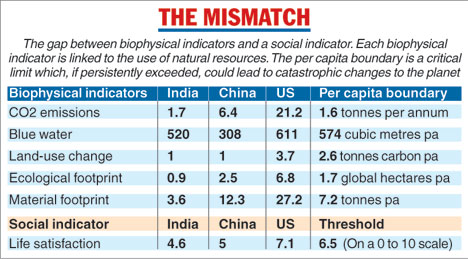
New Delhi: Not a single country among 150 worldwide is able to deliver a "good life" to all its citizens while sustainably using up natural resources, scientists said on Monday in a study that puts India among the bottom 20 on key good life measures.
The study by researchers in Germany and the UK suggests that while basic needs such as nutrition and sanitation may be achieved by all countries without transgressing environmental limits, the pursuit of high life satisfaction may demand use of resources far beyond sustainable levels.
Their analysis, published on Monday in the journal Nature Sustainability, has found countries across western Europe and North America with high scores on multiple social measures - life satisfaction, healthy life expectancy, education, nutrition, sanitation, access to energy, income and equality, among others.
But these countries are able to surpass key thresholds of social parameters at levels of natural resource use that is far beyond what is globally sustainable, the study has suggested.
"The current picture doesn't look good," William Lamb, a research scholar and co-author at the Mercator Research Institute on Global Commons and Climate Change, Germany. "The more social thresholds a country achieves, the more environmental boundaries it transgresses. At this point, we don't see any country that meets all social thresholds and does so at sustainable levels."

But there are examples of some countries - "notably Sri Lanka and Vietnam which are closest to this goal, although both these countries still have relatively low scores on several social thresholds".
The study examined each country's use of resources against planetary "boundaries" and mapped them alongside their social indicators. These planetary boundaries represent values which, if persistently exceeded, could lead to catastrophic changes to the planet.
India scores relatively low on every one of the 11 social measures that the study examined as indicators of a good life, compared with the US or the UK, but also has lower levels of environmental transgressions than either country.
Other countries among the bottom 20 with low scores on social indicators include Angola, Bangladesh, Bolivia, Cambodia, El Salvador, Ghana, Pakistan and South Africa.
The scientists say their study implies radical changes are needed if people worldwide are to live well within the limits of the planet's resources. "These changes would include moving beyond the pursuit of economic growth in wealthy countries, shifting rapidly from fossil fuels to renewable energy, and significantly reducing inequality," Julia Steinberger, a co-author at the University of Leeds, said.
For all people to lead a good life within the planet's limits, she said, the way the planet's resources are distributed needs to be "fundamentally restructured" to allow for basic needs to be met at a much lower level of resource use.











